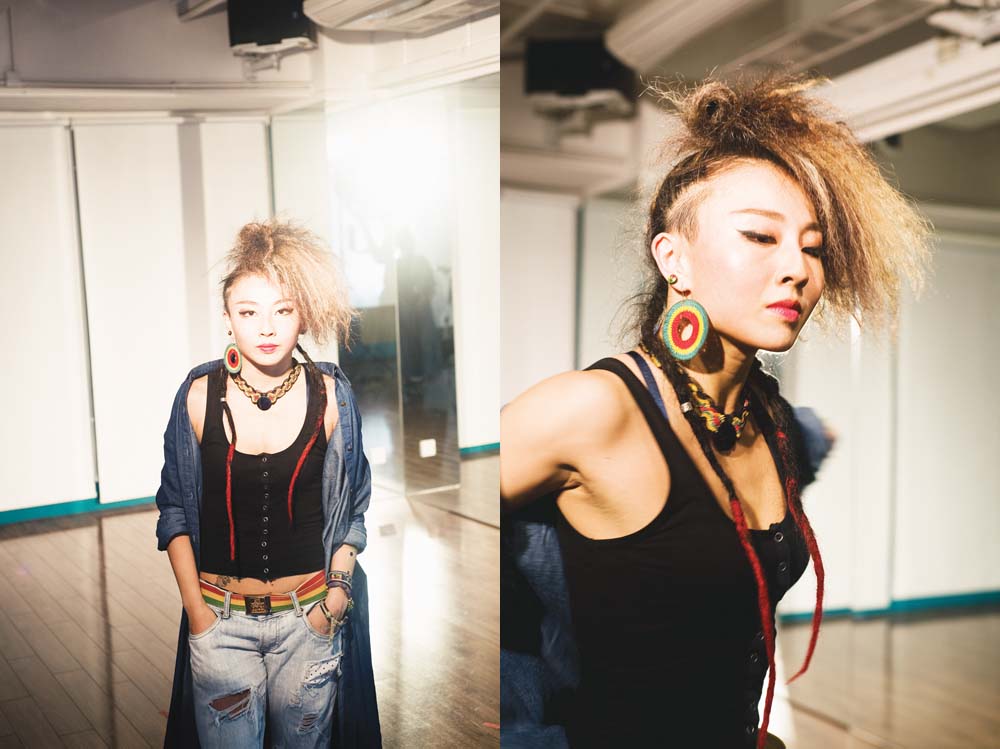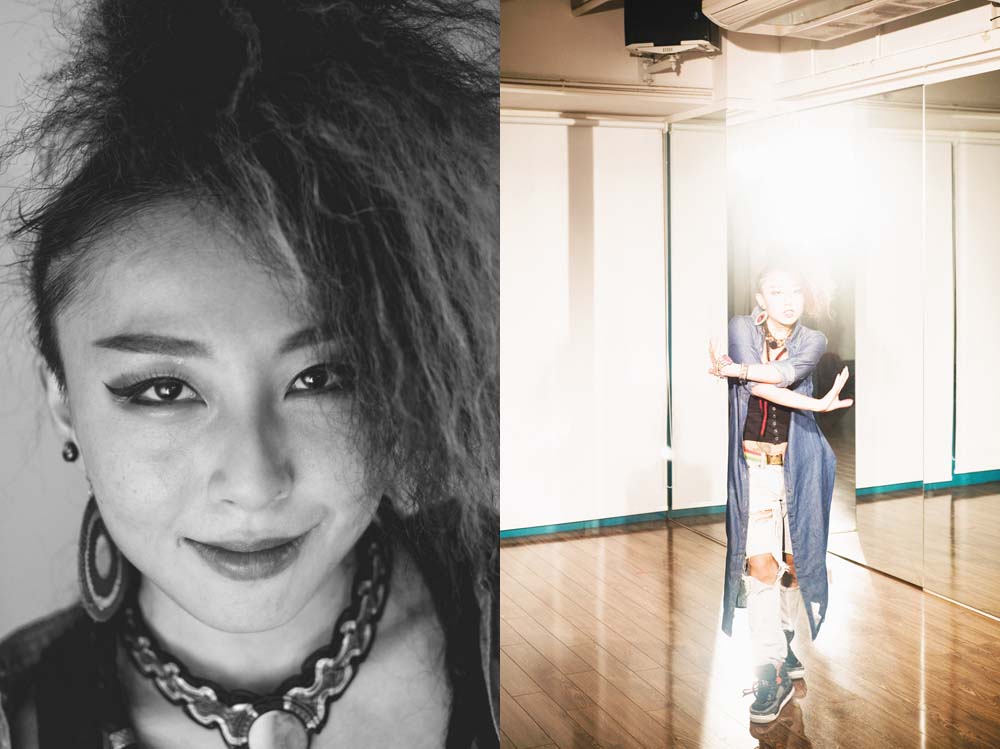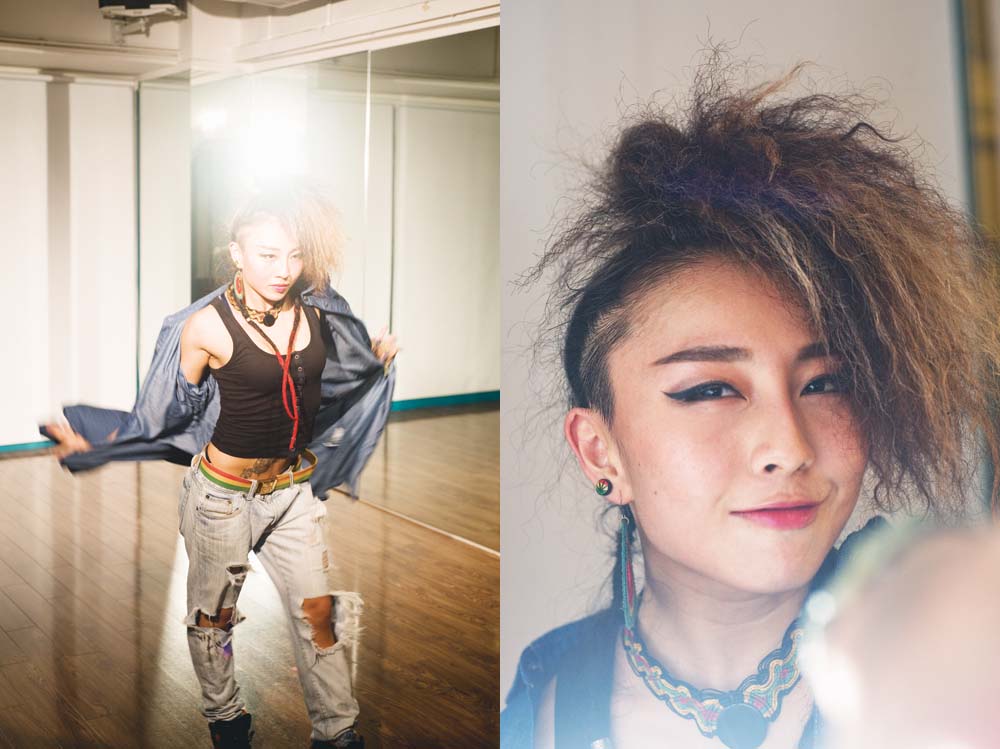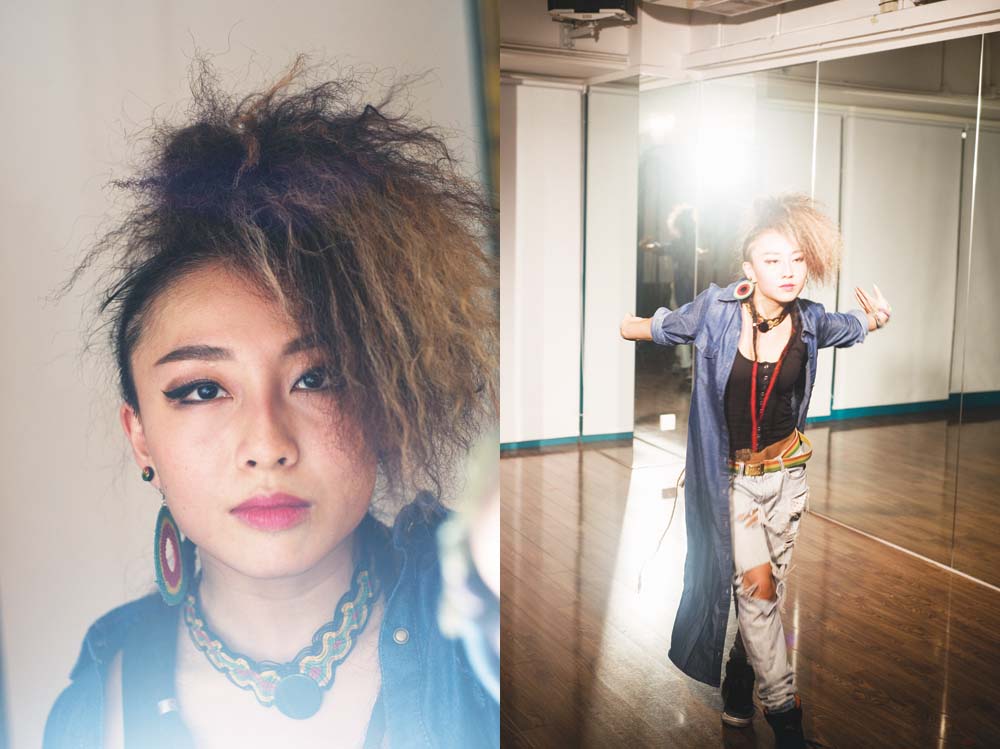
特別嗚謝/Special thanks to ‘Lil Fly
翻譯/Translation – Sharon Chiu
攝影/Photos : Nick D for Precursorprints.com
當Lil Fly跟我提及Suki Rabbit時,說她曾跟Suki學舞,我立即打起十二分精神,因為Lil Fly介紹的,都是非等閒之輩。我對於街舞這一欄也有些許認知,因為身邊也有朋友會定期舉辦一些與Hip Hop 、街舞有關的活動,但卻未曾聽過Suki Rabbit這個名字。於是我在YouTube上稍為搜索一下,BLAM! 很快便出現Suki Rabbit的街舞視頻。對於一隻兔子來說,她有著的是人類的超級基因,這當然是開玩笑,但在她的視頻中,你可以見到她跳Reggae及其他音樂時的超凡舞姿,她有的是勁,超酷!那些自命IT Girl的時尚博客,看看什麼才是真正的“IT” 吧。
< < CHINESE CONTINUED AFTER ENGLISH >>
So a ‘Lil Fly told me a while back about this amazing dancer in Hong Kong called Suki. Said she trained under her a bit, so my ears perked up cuz, when a ‘Lil Fly speaks, you know, ish gets a buzzing! I feel I have a foothold in the Hip Hop/dance game because I have some friends pretty involved in throwing events on the regular, but the name doesn’t register. A little Youtubing though and BLAM! There’s Suki! Suki Rabbit. For a rabbit, she definitely has dominant human genes! Jokes. Girl don’t kill me! In the videos, you can see Suki gots the funk. Seeing her get down to Reggae and different music styles, you just see she’s got IT you know, by the ton. So yeah, for all of fashion bugging out over whatever self-ordained ‘it’ girl of the moment, let’s ordain our first at SPITGAN, Suki Rabbit!
SPITGAN : Why do you dance?
Suki Rabbit : Because dancing makes me happy and is the way I release my emotions. Every time I hear the music, I feel things in my brain, and my energy finds the way out. Dancing has become a part of my life. Without it I have no place for release. It’s very simple, I dance whether I’m happy or not.
SG : Are you more yourself when you dance?
SR : I really like the free spirit of freestyle (dance). I’m afraid of the limitations of traditional formats and being trapped by a lack of creativity. Every time when I hear the music, it inspires my freestyle movements, I find that’s the “real me”. I don’t know if I would be “wilder” or not, I’m just being myself when I dance. I dance to the music. When the music goes wild, I follow.
SG : What’s the most important part dance?
SR : Every part is crucial from the techniques, and emotions, to your soul. There are no rules saying if you’re a bad dancer you can’t dance. Everyone can dance. Dance can be purely a hobby or a profession, but when dance is your profession, you have to be good. So it really depends on dancing in what circumstance. When I work, I use more techniques, but when I am doing freestyles and dancing in my leisure time, I use more emotions in order to express myself. Different music can generate different emotions, and I use different emotions to interpret it. For different occasions I use different approaches too.
SG : I think your dance style is very aggressive and full of power. How would you describe your own style?
SR : My dance style is very me, so I never really think of what style that is. I’m just being myself. Suki is Suki. It’s hard to find words to describe. If you have to have a name for it, maybe it’s “Suki Style”.
SG : Do you watch your own dance recordings?
SR : Yes, (to see how I do) sometimes I like my performance, and sometimes I don’t. When I see myself dance poorly, I will get upset and give myself some pressure to dance better next time. Of course, there are times I am satisfied with myself.
SG : How did you discover dance?
SR : When I was a kid, my parents would give me lots of freedom and let me try many things. When I learned ballet, I realized I love dancing, but ballet wasn’t the dance style I liked. I loved art back in the days. Drawings, designs etc. but I never did well in school, so I decided to spend more time on dancing. I never thought of being a professional dancer. I never chose dancing, but dancing chose me. I say that because every time I wanted to give up, it always came back to me like an addiction. In the path that I have travelled, I have met lots of friends who share the same dream, as well as, mentors and students. Their support and encouragements are my motivations to carry on. There are many things in life that I feel happen against my own will, but dance give me a clear mind and lets me be myself.
SG : How difference is the dance scene when you first started to now?
SR : There’s been big changes. When I first started, I thought the world was small. I would see things quite narrow, and I thought as long as I made an effort then everything would be fine. Then when I had more responsibilities, especially when I became a dance teacher, I became stricter with myself. Days when I didn’t wanna dance, I would force myself to face my own weaknesses. When I was a kid, to me, dance was simple, I just danced with a group of friends and made it cool. But when you grow up, you naturally will have more expectations of yourself. I didn’t start with Hip Hop or Dancehall, not the freestyle I’m dancing right now, I was dancing in routines back in the days. Routines; the dances are designed by someone else in advance, and it’s more like a performance style. Freestyle, how I dance now is completely created by myself. There is more pressure in freestyle. When I was a student, I thought, go to class, practice, do what the teacher tells you to do, and it’s all good! Now that I have become the teacher, I am afraid if I can’t do what I tell my students to do, then I am not leading by a good example. I also fear not giving my best. So when your role is different, and the time is different, what you expect from yourself will also change accordingly.
SG : When did you think you started to come into your own in dance? I asked because I think your style is very unique.
SR : Every dancer starts with finding their own style. Maybe because in Hong Kong there is such a lack of a native culture; the education systems are so forceful and uncompromising…many things in life are designed or prepared by the parents. So many kids just don’t know what they really want at the beginning. I was in a dance association when I was a kid, and I would listen to whatever the teacher said. Dance what she told me to dance. Then I realized there were these other forms of dance called Hip Hop and Jazz, apart from Ballet, all by chance! That’s how I started. I remembered my teacher asked me what I wanna do after graduation, and if I wanted to follow him in dance. That’s how I met Fat J, a very important person to my dance career. Fat J is an OG and very well known in street dance circles (in HK). He was one of the first to dance in front of the TST culture center. He gave me a lot of encouragement at that time, and asked me to join his dance crew. Fat J taught me a lot of things including the culture of Hip Hop, and schooled me on the real essence of Hip Hop dance; it’s free spirit. I was so afraid at the beginning because I always danced these routines. It was terrifying when he pushed me to freestyle in a dance competition. That was my first time, and that’s how I started. Since, I’ve observed a lot of dancers, learned from others, and realized girls doing this can be very sexy. Street dance is all about attitude. Attitude is the key. At that time the street dance scene was big in China, people love going to China to battle. I bought a train ticket and went to China to dance. That’s how I started freestyling.
SG : So the dance culture in China is bigger than HK?
SR : Yes, the street dance scene in HK came a lot later than China. This generation is way luckier than ours. They can see things so easily by browsing the Internet nowadays. I remember our generation, we could only go to Shun Woh mall to buy dance videotapes, and we spent a lot of effort to save for an air ticket and go see the world.
SG : Were there a lot of B-Girls when you started?
SR : A lot of girls danced but not in street dance circles. It’s getting to be more girl street dancers now but still not that many.
SG : Who’s your inspiration?
SR : I remember when I first started I didn’t know what “popping” was, so I went to the video store in Shun Woh Mall, and the owner introduced to me a very famous OG called Mr. Wiggles. I tried to learn his steps but it was hard! Then I started to observe different dancers, especially dancers from Japan. There was a female dancer Yoshie who danced “Funk Style”. She is the top of the game in Asia, and I admire her a lot. Her dance style is so inspirational. She’s getting old now but she’s still dancing, her spirit, her energy, inspired a lot of dancers nowadays. In fact, I always find Japanese dance crews inspirational. I also admire another Japanese Hip Hop dance crew called Electric Troubles, and a crew, WCO. They were the one’s who gathered more dope dancers together, to introduce many different styles. One time I watched a famous dance competition called “The Game”, and saw one of their crew, Yokoi battle with Kato, from another dance crew called D’oam. That battle really opened my eyes.
I also like Niako from Europe, his dance style is so different. Street dancers from Europe are more creative and free form. I guess that’s related to their lifestyle and culture. It’s a different inspiration to me. Elite Force’s Harry Link and Bobby are also my inspiration. I was lucky enough to join their workshop in HK when they visited. They showed me the essence of Hip Hop dance, and different ways to express it. Actually, the new generation of dancers can be inspirational to me too, even students, because the positive energy in dancers is very strong. Everyone can be inspirational. That’s why I like people with positive energy.
SG : Why do you think there is a separation now of the four elements of Hip Hop?
SR : I think they’re still linked. Like a DJ is crucial to street dance. Without a DJ, dance can’t exist! A good DJ is the key to a good vibe and can greatly affect a dancer’s performance.
SG : But we don’t see these four elements link together in many events as it was originally intended.
SR : Well yes, I agree things have changed nowadays, it’s become so intentional. Maybe it’s not a bad thing. Hip Hop was born from the underground, but without those commercial events to promote it, people may not have been aware of this culture. I went to a dance camp called Ba Ba Boom in Italy years ago, it was not a Hip Hop event, but a Reggae event. That was such a good experience, the party atmosphere were so strong. I think a party atmosphere is very important to dance events. A Cypher is supposed to form naturally, but now it so intentional. Hip Hop dance should be a party, how can it be without a party atmosphere?
SG : Can you describe the street dance scene in HK? I seldom see B Boys in the clubs.
SR : I think this is one of the problems generated by HK society. People in HK are so intense because of the physical environment. As to what I said earlier, many dancers dance just because they want to dance well. Of course that is not a bad thing, but you also have to enjoy it. There are public spaces in HK designed for people to dance nowadays; spaces in City University, Poly U, where you will see cyphers and battles, but it’s seldom that these people will go to clubs to dance and relax. Of course we’ll go to clubs sometimes. You just won’t see us dance as we are used to dancing.
SG : Why not? Is it because of the venue or the music?
SR : Could be, like I said, people in HK are just forcing themselves too much. How can you still have the energy and mood to go clubbing when you have been working all day? Look at me! I want sleep more than go clubbing.
SG : Why don’t popular Hong Kong musicians make more dance music in your opinion?
SR : There are too many restrictions in the HK music industry, in terms of production and creativity. There is no format which is belongs to HK itself. For instance, when K-pop got popular, HK music suddenly became very K-pop style. And when J-pop was a big hit years ago, HK music followed. When Lady Gaga became the queen, then HK music was full of her influence. HK has no style to call its own. No Hip Hop culture of its own. The States is where Hip Hop is from. Africa has their drum culture. Even Jamaica has Reggae, but there is nothing from HK, so it’s hard to have a music that can really move you.
SG : That’s strange, unlike China, HK can access all kinds of information. Korea has K-pop, Japan has J-pop, how come HK can’t create an international crossover hit?
SR : Maybe because there are not many people who dance here. Music and dance are tightly linked together all the time. The problem is, in HK, there isn’t any dance culture of its own. We don’t have that history. We can dance to HK music, but what we are dancing to now is Hip Hop. Without that culture naturally it would lack the songs.
SG : It just seems so far fetched to believe that one couldn’t interpret music styles that are already popular and have them popular in HK. Hip Hop was born in the States, but look at Drake, he is from Canada. He is huge now and he has created his own lane. Even the French can create good Hip Hop. Where is its distinction in HK?
SR : You know what is strange? HK is so small but the distance between people is huge. Like me, I might be well known in the street dance circle, but in the MC circle, I might be not. I believe there are hidden talents in HK, such as Hey Yo and LMF, it’s just a lack of channels for us to meet. We are not close to each other, and it affects the culture.
SG : Are you the B Girl queen?
SR : No, I am not a B Girl. I learned breaking before, but I knew I wasn’t good at it. In street dance, there are divisions like popping, locking etc. I am dancing a part of the whole, Hip Hop and Reggae, which was born in the 80s, and I would add popping and Dancehall in it sometimes. I am not a good popper, many dancers dance better than me, but I know if I add different elements in my moves, with my own emotions and techniques, it can enhance my style, a style which belongs to Suki, Suki style!
SG : What is the biggest street dance competition in HK?
SR : There are many, and more are coming up too, so it’s hard to say which is the biggest. Street dance is divided into two parts nowadays, choreography and freestyle. Like every year in the “Animation Festival”, there are choreography and freestyle competitions. There is a battle called “The Queen”, which is specially designed for female dancers.
SG : As a dance teacher, do you feel a responsibility to teach the next generation? Do you feel that pressure to pass on the knowledge?
SR : I think it’s not easy to be a teacher. As I said before, it was dance who chose me. To me, being a teacher is not a hobby but an aspiration. When you become a teacher or a senior, you would naturally affect the people surrounding you. When I was a student, I was affected by the people around me too. Every teacher has gone through the student stage, without it, you would hardly know how to teach. Even today I still go to class to learn, because knowledge is very important, and it is born everyday. What was happened yesterday will become a history of today. So knowledge is important, so are techniques. Even if you dance well, that doesn’t mean you can teach. The most satisfy moment to a teacher, is to see students born as a “blank paper” or a small pea. To watch them grow and get better. You even want them to be better than yourself. Nothing can compare to that fulfillment. I am very lucky to have a group of good students, we discuss not only dance related matters but also things in life. We exchange thoughts on culture. We express ourselves freely to each other.
< < CHINESE CONTINUED BELOW >>
SPITGAN : 為什麼你會選擇跳舞?
SR : 因為每當跳舞我都會感到很開心,我喜歡可以讓我抒發情感的事物,而舞蹈正好可以讓我抒發個人情感。每當我聽到音樂,透過舞蹈我便可以把腦裡面所想的事情及身體的能量釋放出來。舞蹈已經成為了我生活的一部份,沒有它我的情感便沒地方釋放。其實很簡單,開心或不開心的時候我也會跳舞。
SG : 你跳舞時是否很放?
SR : 是的,我十分喜歡freestyle那種自由,我害怕被一些模式所限制,又害怕被沒有創造力綑綁。在我聽到了音樂、跳freestyle,那時候才是真正的自己。放?我不知道那算不算放,我只是做回自己而已。我會跟隨音樂而改變,音樂狂野時我也會變得十分狂野。
SG : 你覺得什麼在舞蹈中最重要?
SR : 我覺得每一部分都重要,包括技巧,情緒及心靈等。其實所有人都可以跳舞,不是因為跳得不好就沒有資格去跳。跳舞可以分業餘與專業,但作為專業,我覺得便要跳得好。所以要看是什麼情況下跳舞,在工作的時候,我會相對地運用較多技巧,而在娛樂、freestyle 的時候,我則會用更多情感去表達自己。不同的音樂會帶給我不同的情感,所以我會以不同的情感去演繹;而不同的場合我也會採用不同的模式去跳。
SG : 我覺得你的舞步是帶有侵略性、很有力量的,你怎樣形容自己的風格?
SR : 因為我的舞步是很“自己”的,所以我從沒有特別去想那是什麼風格,我純粹表達自己而已,Suki is Suki,很難去找一個詞語去形容。SUKI就是一種風格吧,可以叫做SUKI 風格,哈哈!
SG : 那你有沒有經常回看自己跳舞時拍的錄影?
SR : 有的,有時我會喜歡自己的表現,有時則不。譬如有一些battle的時候我不在狀態,看到這些我便會很不開心,然後會給自己一些壓力,希望下次做得更好。當然亦有滿意的時候。
SG : 當初是什麼激發了你跳舞的想法?
SR : 小時候,父母給我很多自由,所有東西都會給我試。我學過很多東西,像芭蕾舞。那時我發現自己很喜歡跳舞,但芭蕾舞不是我喜歡的模式。我小時很喜歡藝術,很喜歡畫畫、設計,但由於讀書成績不好,所以想向跳舞及設計雙方面發展。那時並沒有想過要當一位舞者或畫家,可以說不是我選擇了跳舞,反而是跳舞選擇了我。因為跳舞一直與我形影不離,每當我想到放棄,它總會回到我身邊,像戒不掉似的。在我的舞蹈生涯中,我認識了很多朋友,找到了志同道合的人,又認識了我的老師、我的學生。當中我獲得了很多良師益友的支持與鼓勵,成為我繼續跳下去的動力。生命中有一些事物讓我覺得不是在做自己,但跳舞的時候,我很清楚自己在做什麼,唯有跳舞給我做回自己的感覺。
SG : 你覺得今日的跳舞環境與你剛開始時的分別在哪?
SR : 當中有很大的改變。那時覺得世界很細,看的事物都很狹窄,會覺得盡了力便可以了。但當你有了責任,特別是當了老師,又對自己有所追求的時候,縱使有時不想做,都要強迫自己去做,迫自己去面對自己的一些弱點,例如跳得不好,便要迫自己承認不好,然後重新出發。小時候的錯敗感沒有這麼強烈,那時是一幫朋友,覺得讓跳舞變成酷便可以,沒有什麼特別的要求。但當一走下去,你對自己的要求便會相對增加。我不是跳Hip Hop跳Reggae或Dancehall出身,不像現時跳的freestyle。開始時跳的是比較有routine、表演性質比較多的舞步。表演性質多即是說舞步是經過別人安排的,而我今日跳的freestyle則是自己給自己安排的舞步,相對來說給自己的壓力也會增加。那時自己當學生的時候,盡了本份,上了課,練習過,聽了老師說的話,做好了便可以。今日自己當了老師,講得出便要做得到,因為跟學生說話其實亦是跟自己說話,會怕因為自己的身份而遺忘了,會害怕自己做不到、做得不夠好。所以當角色不同了,年代不同了,對自己的要求亦會有所不同。
SG : 你何時開始創造自己的舞步?我這樣問是因為我覺得你的個人風格很強烈。
SR : 每個舞者開始的時候都在尋找自己的方向,可能香港本身沒有太多本土文化,教肓又是填鴨式的,生活上很多事物都是父母安排,所以很多人開始時都不清楚自己想要的是什麼。那時參加了一些舞團,老師安排我跳什麼我便跟著跳。在偶然機會下我從習舞的studio 那裡得知原來除了芭蕾舞,還有了Hip Hop、Jazz這些舞步,於是我便開始接觸這些舞蹈。當時老師問我畢業後想做什麼,有沒有興趣跟他跳舞,機緣巧合下我認識了一個對我很重要的人,他叫肥J ,是香港很早期的街舞舞者,圈內很多人都認識他。他那時給了我很多鼓勵,更邀請我和其他幾位舞者組成一個團隊。他讓我認識了Hip hop的文化,教了我很多東西,讓我發現原來街舞的精髓是無拘無束的去跳。開始時我很害怕,因為一直都是依著一個模式去跳舞,突然一下子把我推出去跳舞,叫我不知所措。我記得在一次小型比賽中,他把我推出去跳freestyle,那時真的怕得要命,但他不斷鼓勵我,說我做得到的,是這樣我便開始了我freestyle的第一次。之後我不斷看一些賽事去揣摩別人的舞步,特別是看到一些女孩子,發現原來女孩子跳街舞都可以很性感,街舞是一種態度,而態度是關鍵。那時跳街舞的人都喜歡到大陸跳舞、去battle,因為大陸的battle文化比較強盛,於是我便買了一張車票,跑到大陸去跟人battle,這便開始了我跳freestyle的生涯。
SG : 你說大陸的街舞文化比香港強烈?
SR : 是的,香港的街舞算是比較遲起步。今日學街舞的人相比我那一代幸福多了,一上互聯網便可以找到很多關於街舞的訊息,隨時買張機票便可以到世界不同各地去看街舞。我們以前都是跑去信和買有關方面的錄影帶,要儲很久的錢才可以到其他國家看表演。
SG : 在你開始跳街舞的時候,女生的比例多嗎?
SR : 那時跳舞的女孩子很多,但跳街舞的很少。現在比之前多了,但數目還是不多。
SG : 有什麼人給了你啟發?
SR : 我記得開始的時候不知道什麼是Popping ,於是跑去信和一間買街舞錄影帶的店去找有關的視頻,那時的店主向我介紹了Mr. Wiggles這位非常有名的OG,我嘗試學他的舞法但不成功,於是又開始看不同舞者,特別是一些日本舞者,當中有一位跳funk style名叫Yoshie的女舞者,她算是亞洲最top的女舞者,是其中一位我很欣賞的舞者,她的舞步、她的內涵都很具啟發性。我欣賞她雖然年紀已不小了,但還一直的跳著,她的精神,為我為今日很多跳舞的人帶來無盡的鼓勵。還有來自日本的Hip Hop dance crew Electric Trouble,及一個非常厲害的舞團叫作WCO,就是他們再組合其他超強的前輩,混合更多不同的舞風。另外,日本街舞對我有很多啟發,我曾經有幸在日本看過一個battle“The Game”,我們稱它為日本battle界的“世紀大戰”,當中Electro Trouble中的Yokoi,在“The Game ”與另一個dance crew D’oam的Kato對戰,那次對戰真的叫我大開眼界。這些人物都很能啟發我。而來自歐洲的Niako,也讓我看到另一種風格。歐洲舞者都是充滿創造力與比較隨心,這與他們的lifestyle及生活模式有關,對我來說是另一種啟發。來自美國的OG 們Elite Force 的Harry Link及Bobby,也是比較早來到香港分享的舞者,我有幸去了他們的workshop,也感激每一位攪手。他們讓我看到Hip Hop 舞的原汁原味,和另一種層次的表現。這些人物都為我帶來不少靈感。而新一輩的舞者,甚至學生也曾啟發我,因為跳舞的正能量實在很大,每一個人都有機會影響到別人。所以我很欣賞及喜歡有能量的人。
SG : 你覺得為什麼今日Hip Hop的四大重要元素:Breakdance、MC、DJ及Graffiti當中有著斷層?今日去看一些比賽或演出,會很少看到四個元素同時出現。
SR : 還是有的,其實跳舞最重要是音樂,沒有一個好的DJ,沒有好的音樂,跳舞是很難成立的,DJ是影響整個場地的氣氛、影響舞者演出的關鍵。
SG : 今日美國很多Battle,DJ當然是有的,但已經很少見這四大元素同台演出了。
SR : 是的,我也覺得今日很東西已經變了質,變得很刻意,很刻意去找一個DJ及一些人去參與,但也不是壞事情,因為這樣做的話可以更多推動這種文化。是的,Hip Hop文化沿自地下,但在今日如果不去攪這些活動的話,可能真的不會有這麼多人認識。
我之前去過意大利參加一個露營活動Ba Ba Boom,那個不是Hip Hop dance battle而是一個Reggae的活動,那次真的是一個很好的經驗,派對氣氛很濃厚。我覺得派對感是很重要的,Hip Hop Dance活動也應如是。像Cypher在Hip Hop裡頭是很自然發生的情況,但今日卻是很刻意的。Hip Hop理應是一個派對,怎可以沒有派對氣氛呢。
SG : 你可以形容一下香港的街舞文化嗎?很少在夜店見到B Boy演出。
SR : 這就是另一個香港社會狀態衍生的問題,香港人都迫得自己很緊。正如我前面所說,今日的人練舞是為跳得好,跳得好當然很重要,但也不能不去享受派對當中的樂趣。今日在香港也有一些地方劃分給跳舞的人,像在城市大學、理公大學,大家也會Cypher起來切磋舞技,但卻很少去Club、喝喝酒,輕鬆一下跳跳舞。當然我們間中還是會去夜店玩,但是跟我們平時跳的不一樣。
SG : 為什麼不?是因為音樂或場地的問題嗎?
SR : 也是的,但還是像之前所說,香港很多事情都把人迫得很緊,試問一天工作了這麼長時間,像我,一天工作這麼累,要的是睡眠多於到夜店跳舞呢。
SG : 你覺得為什麼香港跳舞音樂佔的比例不多?
SR : 香港樂壇有很多限制,無論在製作上、又或在創意方面,沒有一個屬於香港自己的模式。舉個例子,K -Pop近年流行起來,香港音樂就出現了K-Pop的影子;又或之前J-Pop大行其道,香港樂壇又帶有J-Pop的影子。Lady Gaga紅起來,香港的一些音樂突然又有點像Lady Gaga的風格。香港沒有屬於自己的“東西”,沒有自己的Hip Hop 文化,不像美國,Hip Hop誕生自美國。非洲有自己的非洲鼓文化,牙買加有自己的Reggae文化,但香港什麼也沒有,永遠做不到可以令人一聽便舞起來的音樂。
SG : 這很奇怪,香港不像大陸,在這裡資訊發達,甚麼都可以找得到,韓國有K-Pop,日本有J-Pop,為什麼香港卻做不到?
SR : 可能是因為在香港跳舞的人不多,而音樂與跳舞永遠都是手牽手的。但最大問題還是香港沒有自己的一套跳舞文化,沒有那種歷史。我們不是不可以聽中文歌去跳,但是我們跳的是Hip Hop dance,香港沒有那種文化,自然沒有那種歌。
SG : 但真的沒有一個音樂創作人可以依據香港的特色去創作嗎?Hip Hop是誕生在美國,但你看Drake,他是加拿大人,今日他在Hip Hop的領域上也很重要。法國人也在創作Hip Hop,為什麼唯獨香港沒有優秀的Hip Hop誕生?
SR : 我覺得很奇怪的是,雖然香港地方小,大家的距離卻很大。像今天的我,在街舞圈中會比較多人認識,但在MC界,可能很多人都不知道我是誰。我深信這裡有一些優秀的音樂人,像Hey Yo像LMF,只是沒有太多渠道讓我們走在一起,大家不夠近,導至整個文化不夠強烈。
SG : 你是香港B Girl界的皇后嗎?
SR : 不是啊。其實我不是B Girl 。我曾經學過Breaking,但卻並不是跳Breaking的材料。街舞除了有Breaking ,還有Popping、Locking等,我是跳街舞系列的一個分支,我跳Hip Hop也跳Reggae,是很後期約在80年代出現的舞步。當中我也會加一些Popping、Dance hall。我不是一個很好的Popper,很多人跳Popping比我好,但我知道將加入不同元素入Hip Hop,再加入自己的情感、技巧,可以將自己變得更強大,一個屬於自己的Suki style。
SG : 香港最大型的街舞比賽是那一個呢?
SR : 有很多。在香港有愈來愈多的這些比賽出現,很難說那個比較大。當中又有分“Choreograhy”與HiFreestyle兩種。像在每年一度的動漫節會有Battle及齊舞比賽。又像Endless Rolling,會有很多跳Hip Hop的舞者參加。或有專給女孩子參加的叫The Queen,是女孩子Battle的比賽。
SG : 作為一個老師,你覺得有責任去影響、教導和傳授技巧給下一代的人嗎?你感到壓力嗎?
SR : 我覺得當老師很不簡單,不是說說這麼容易。正如我之前所說,是舞蹈選擇了我。對我來說當老師不是興趣而是抱負。當你成為了老師或長輩,不其然便會影響到身邊的人,像當年我當學生一樣,都受著老師、長輩的影響。每個老師都會經過當學生的階段,因為不經過這個階段,你根本不知道怎樣去教導別人。甚至是今天的我雖然是一個老師,我還會去上堂去學習,因為知識是很重要的,而知識每日都在產生,昨天的事物今日也可能成為歷史,所以知識一定要有,能力一定要有。就算你跳舞跳得很好,但也不代表你有能力去教別人。當老師最開心的時候,是看到開始時像一張白紙、一粒小豆的學生成長,愈跳愈好,甚至你會想看到他們跳得比你好。那種由沒有到有的成功感,是很多事物不能相比的。我很幸福,有一班很好的學生,我們平時除了說一些有關跳舞的事情外,還會交流文化上的想法,大家都會道出自己意見。
SG : 你覺得“新中國”這一詞對你來說有什麼意思?你覺得今日這一代的態度與想法有什麼改變?
SR : 我覺得有好有不好的地方,今日這一代都有自己的想法,頗自我的。他們比我們那一代聰明及有主見,但同時又變得比較難教。他們有自己的一套,多了很多機會看不同的事物,較主動,有自己的態度,亦會表達自己的意見。不像我們以前,老師說什麼我們便跟著做。因為接觸的事物多了,跳舞的人又多了,他們會有自己的風格。那是一件好的事情,但我覺得學生都要自己找平衡,今日的人都會將choreography 與Battle分開,但真正喜歡跳舞的人,兩樣都要懂,我說的是有routine的及freestyle的都要有能力去跳,才可算是一個全面的舞者。
SG : 你對自己的將來有什麼想法?
SR : 我覺得自己是一個十分幸運的女孩,當然不是所有事物都要靠運氣,我也有盡力過。一步一步來吧,我沒有想太多之後的路應該怎麼走。因為跳舞選擇了我,所以很多事物都是自然而然的,就像我小時候也沒有想過會當一個跳舞老師,只是參加了學校的一個舞蹈比賽,然後就這樣走下去了。我覺得盡力就是你的未來,很難去說夢想這回事,因為不是你說做就一定做得到。只要你盡了力,有了信念,你未來的路就可以走出來。我當年也沒有想過自己會有勇氣跑去日本去美國去看,我的英文不好,還記得在美國機場忍不住流下眼淚,因為不知道出口在哪裡。但很多事都是迫到頭來你便會知道怎樣做。我沒有想過自己有一日是否可以成為世界級,會不會成為最好的老師,但當你有信念,當你真正喜歡那件事,你的能力、你的潛能便會冒出來,你的未來便會走出來。有心就有潛能,有潛能就有未來,有未來你就會有夢想。







Speak Your Mind